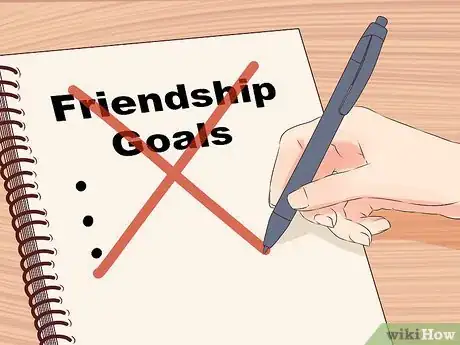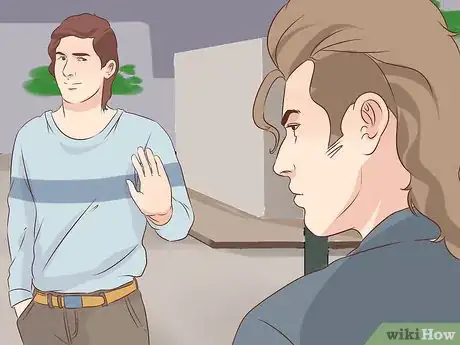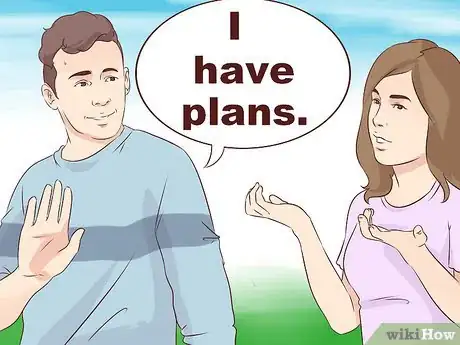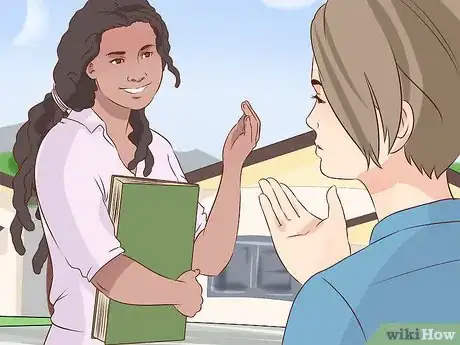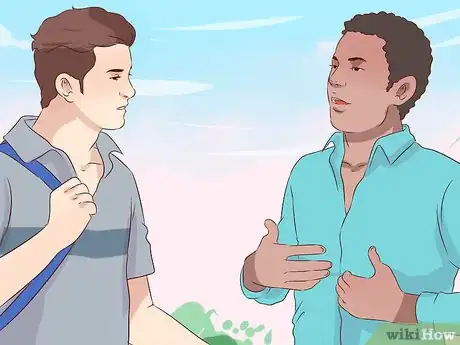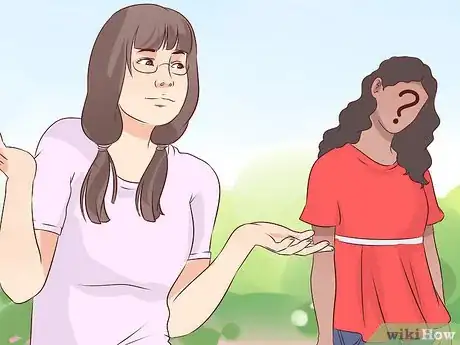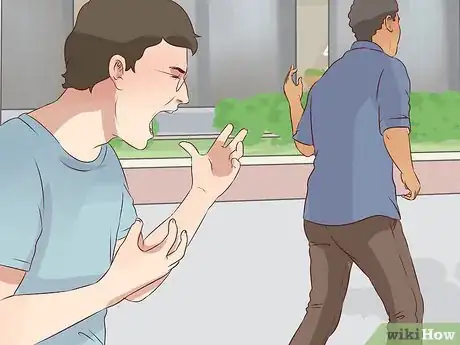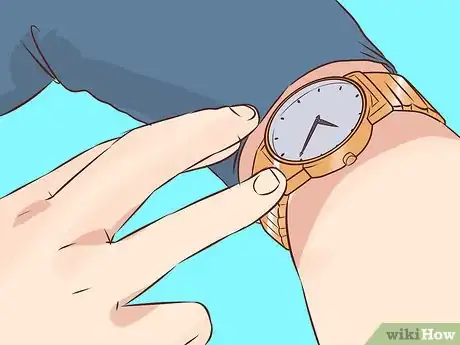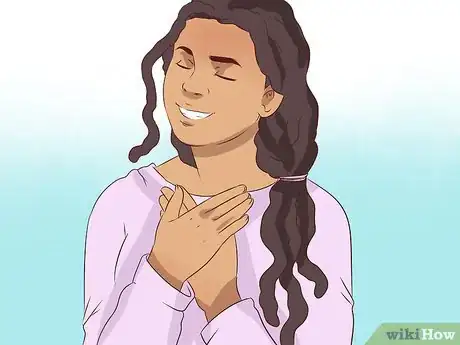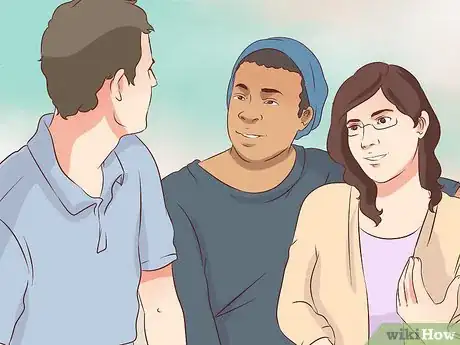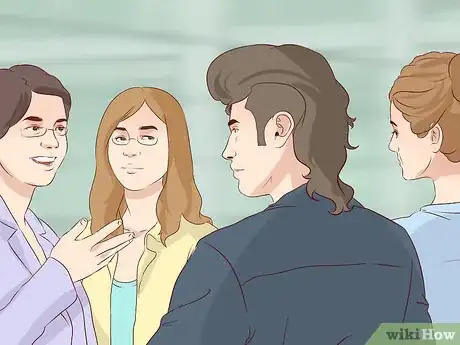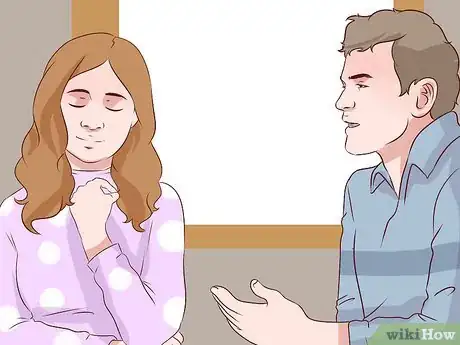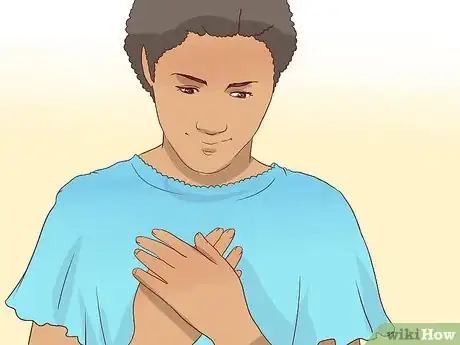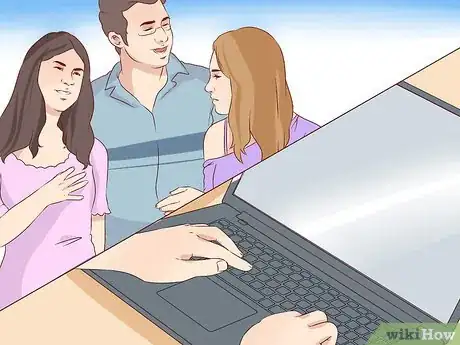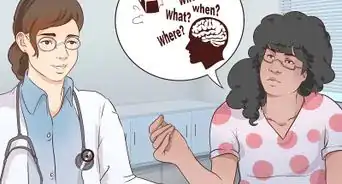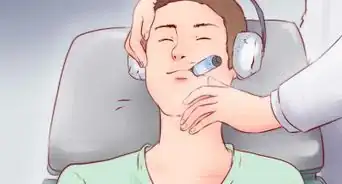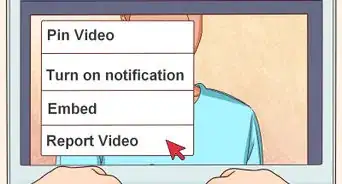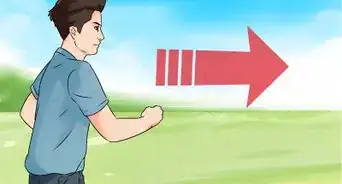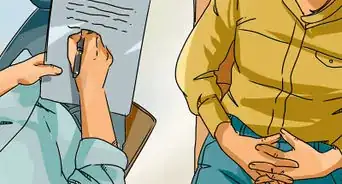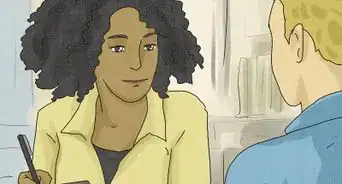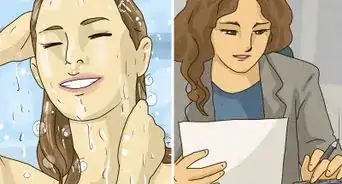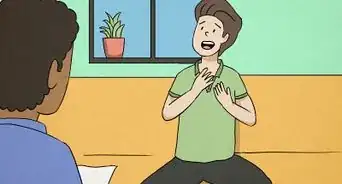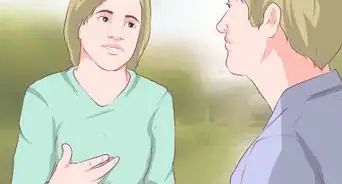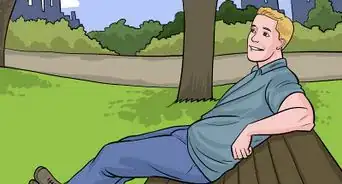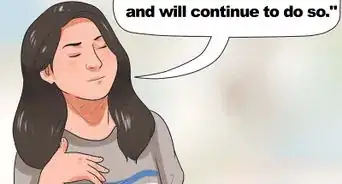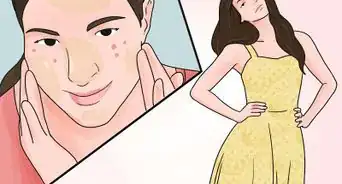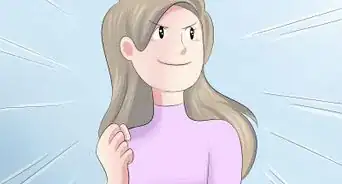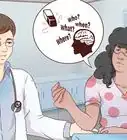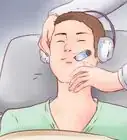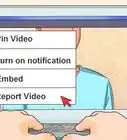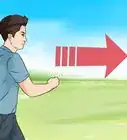This article was co-authored by Stefanie Barthmare, M.Ed., LPC. Stefanie Barthmare is a Licensed Professional Counselor (LPC) with a private practice in Houston, Texas. With two decades of experience, Stefanie specializes in body-based trauma treatment and counseling for relationship issues, parenting and family struggles, depression, anxiety, and grief. She holds a Bachelor’s degree in English from The University of Texas at Austin and a Master’s degree in Counseling Psychology from The University of Houston. Stefanie is also an LPC Associate supervisor and consults as a facilitator for groups in the educational, spiritual, and business communities.
There are 16 references cited in this article, which can be found at the bottom of the page.
wikiHow marks an article as reader-approved once it receives enough positive feedback. In this case, 87% of readers who voted found the article helpful, earning it our reader-approved status.
This article has been viewed 111,984 times.
Some friendships or relationships are meant to last forever. However, this just isn’t true for all of them: sometimes, you and a friend have learned all you can from one another, and it’s time to slowly let each other go. It’s hard to end a friendship without hurting anyone’s feelings, but if you try to practice kindness even as you stop spending so much time together, you will move apart easily and with little drama.
Steps
Moving On
-
1Stop making plans. Once you’re sure you no longer want to be in touch with your friend, don’t invite them to do things any more. Friendships require mutual effort. If you don’t do your part to plan hangouts and activities for you both, the friendship will be thrown out of balance and fade.[1]
-
2Don’t initiate conversations. You can still nod and say “hello,” but if you’re trying to end a friendship, don’t just walk up to the person and start talking about what happened on TV last night. It will be confusing for them and feel like a waste of time for you.
- Conversations aren’t just in person--texting and social media count, too. If you’re really trying to end a friendship, don’t indulge in these more than the occasional “like.”[2]
- If your former friend starts a conversation with you, try to end it quickly. You can do this by not asking a lot of questions, and then by saying something like “see you later!”[3]
Advertisement -
3Have other plans. If your former friend asks you to do something with them, but you’re trying to avoid them, it’s best not to. Try to keep busy with other friends, work or schoolwork, or family obligations, so that you’re busy when they try to reach you.
- You might have to tell a lie to protect your former friend’s feelings. If you do, make it simple, vague, and easy to remember. “I have plans Saturday” is fine, and if they see you roller skating with two other people, they won’t think you were lying. “I have to sing the lead in an opera” obviously won’t work.[4]
-
4Be polite. You may not be BFFs any more, but that doesn’t mean that you have to totally ice this person. When you see them, be cordial, maintain eye contact, and provide help if they really need it (e.g. if they need to know what the French assignment was). You are trying to set boundaries, not hurt anyone’s feelings.[5]
-
5Don’t get drawn into confrontation. If your former friend wants to talk to you about why you’ve disappeared, try to defuse a fight before it starts. Assure them that they aren’t a bad person and that they have a lot going for them. Emphasize that you’re busy and putting energy into other things right now.[6] You can say something like "I've been spending so much time on my writing that I've been bad at texting back."
- Don't apologize too much if it feels insincere.
- Emphasize the differences between you. This will drive home the fact that you’ve both grown, and have grown apart.
Choosing to End a Friendship
-
1Decide why you want to drift. Like most important relationships, even the best friendships can feel a little constricting or boring every once in a while. However, if you’re feeling frustrated with your friend more often than not, it might be a sign that you’ve outgrown the friendship. Ask yourself:
- Do you feel like you have nothing to talk about anymore? Differences are awesome, but if you and your friend have nothing in common any more, the friendship might be higher-maintainance than it’s worth.
- Does your friend only get in touch with you if they want something, like your notes or your car for the evening?[7] It’s not much of a friendship if you feel like you’re being taken advantage of.
- Does your friend make you feel like less than your best? Sometimes we rely on those we love to push us to be better. However, if your friend constantly corrects you or makes you feel bad about yourself, you might be better off without them.[8]
-
2Leave an abusive friend now. Not every friendship that has reached its expiration date should end organically. If you have a friend who physically or emotionally hurts you, get away as quickly as you can. Friendships can be abusive, just like romantic relationships, and it’s important to take care of yourself as well as possible.[9]
- Identifying abuse in a friendship can be tricky. In general, if you are scared to be with your friend (whether it’s because of things they do or say), that’s a bad sign.[10]
- If someone scares you, there’s nothing wrong with suddenly ceasing to speak to them.
-
3Give it some time. Once you’ve identified a friendship that’s on its way out, but there’s no reason for you to end it completely, sit on it for a couple of weeks. A slow drift is, by its nature, slow. There’s no reason to rush into it, so be certain.
- You may notice that you are missing your friend or craving their company again. If so, hang out with them one more time. Do you have fun together, or do you feel the same problems are in place?
- Your friend might have also noticed that your friendship is cooling. If this happens, they might initiate a slow drift of their own. If they do this, that makes things easier; you don’t have to put any energy into ending the friendship.[11]
-
4Don’t do anything drastic. Friendships are great because they have much less social pressure on them than other types of relationships. Therefore, your decision to let one spin itself out is casual. Don’t mar that by making a big announcement or writing an official breakup note in your friend’s planner.[12]
Maintaining Distance
-
1Don’t hang out alone. Once you’ve successfully drifted apart from someone (meaning that they’ve gotten the message and have stopped trying to make plans with you), do your best to ensure that you don’t see them one-on-one. This means continuing to avoid making plans, of course. Also, avoid being paired up for projects or other collaborative work.
-
2Know when you’ll see them. If you are part of the same group, you will probably be invited to the same events or parties some of the time. Be as prepared for this, so you don’t feel guilty or startled. If possible, arrive and leave with other friends, so you don’t feel too exposed.
- Sometimes other friends who weren’t involved stigmatize both people involved in a friend drift or breakup.[13] Pay this no mind; just keep being polite to everyone.
-
3Don’t be cruel. You probably feel like you had good reasons to drift away from this person, but that doesn’t mean you should spread rumors about them or hurt their feelings on purpose. Be as detached as possible, short of ignoring people when they’re talking.[14]
- Don’t talk too much with others about your decision to end the friendship. It may come off as badmouthing your former friend, which makes you look bad.
- Don’t tell your friend any harsh “truths,” like “no one wants to be friends with you because you’re boring.” It’s a mean thing to do to someone who’s feeling particularly vulnerable, and it won’t help them grow.[15]
-
4Don’t punish yourself. It would be wonderful if all friendships really were forever, but sometimes they’re not: instead, we meet people who teach us about ourselves and the world, and then we move on. Try to concentrate on protecting everyone’s feelings if you can, and on what you’ve learned from the friendship.[16]
-
5Be intentional about your remaining friendships. The end of one friendship has probably taught you a lot about what you’re looking for: common interests, encouragement, and easy communication are all elements of a successful friendship.[17] Put energy into those that you care about, so they can thrive.
- Stay in touch. Social media is a terrific glue, but so is in-person contact. Use a mix of both.[18]
- Plan adventures. Shared time is incredibly important, so make the most of it by arranging activities that both you and your friend enjoy.
- Be honest and learn from your mistakes. This is the best way to ensure that your loss of a friendship didn’t happen in vain.[19]
Expert Q&A
-
QuestionHow long should I take to drift away from my friend?
 Stefanie Barthmare, M.Ed., LPCStefanie Barthmare is a Licensed Professional Counselor (LPC) with a private practice in Houston, Texas. With two decades of experience, Stefanie specializes in body-based trauma treatment and counseling for relationship issues, parenting and family struggles, depression, anxiety, and grief. She holds a Bachelor’s degree in English from The University of Texas at Austin and a Master’s degree in Counseling Psychology from The University of Houston. Stefanie is also an LPC Associate supervisor and consults as a facilitator for groups in the educational, spiritual, and business communities.
Stefanie Barthmare, M.Ed., LPCStefanie Barthmare is a Licensed Professional Counselor (LPC) with a private practice in Houston, Texas. With two decades of experience, Stefanie specializes in body-based trauma treatment and counseling for relationship issues, parenting and family struggles, depression, anxiety, and grief. She holds a Bachelor’s degree in English from The University of Texas at Austin and a Master’s degree in Counseling Psychology from The University of Houston. Stefanie is also an LPC Associate supervisor and consults as a facilitator for groups in the educational, spiritual, and business communities.
Psychotherapist If you're going to do this, it's going to totally depend on the intensity of your friendship, how long you've known one another, and what's going on in your relationship. It's not like there's a one-size-fits-all set of rules for this.
If you're going to do this, it's going to totally depend on the intensity of your friendship, how long you've known one another, and what's going on in your relationship. It's not like there's a one-size-fits-all set of rules for this.
Warnings
- If you’re part of the same clique or group, it might be harder to drift apart.⧼thumbs_response⧽
- Don’t spread gossip your former friend. You may not have clicked with them, but that doesn’t make them a bad person.⧼thumbs_response⧽
References
- ↑ http://www.elephantjournal.com/2010/09/the-friend-divorce/
- ↑ http://www.oprah.com/relationships/How-to-End-a-Friendship-Cutting-off-a-Friend
- ↑ http://www.succeedsocially.com/endconversations
- ↑ http://changingminds.org/explanations/behaviors/lying/white_lies.htm
- ↑ https://www.scienceofpeople.com/how-to-set-boundaries/
- ↑ http://www.chatelaine.com/health/sex-and-relationships/how-to-end-a-friendship-six-tips-to-doing-it-gracefully/
- ↑ http://www.elephantjournal.com/2013/09/3-signs-its-time-to-end-a-friendship/
- ↑ http://girlsleadership.org/resources/videos/how-to-end-a-friendship/
- ↑ http://everydayfeminism.com/2016/03/signs-friendship-abusive/
- ↑ http://everydayfeminism.com/2016/03/signs-friendship-abusive/
- ↑ https://www.psychologytoday.com/us/blog/between-the-generations/202201/8-ways-friendships-fall-apart
- ↑ https://psychcentral.com/health/knowing-when-to-say-goodbye-how-to-break-up-with-a-friend
- ↑ http://nymag.com/thecut/2015/04/ask-polly-how-do-i-deal-with-losing-friends.html
- ↑ Stefanie Barthmare, M.Ed., LPC. Psychotherapist. Expert Interview. 21 May 2021.
- ↑ https://www.harleytherapy.co.uk/counselling/honesty-criticism-or-verbal-abuse.htm
- ↑ https://psychcentral.com/health/knowing-when-to-say-goodbye-how-to-break-up-with-a-friend
- ↑ https://www.joinonelove.org/learn/5-requirements-for-a-strong-friendship/
- ↑ http://greatist.com/happiness/how-to-make-keep-friends
- ↑ Stefanie Barthmare, M.Ed., LPC. Psychotherapist. Expert Interview. 21 May 2021.
About This Article
It can be tough to realize you no longer want to stay friends with someone, but sometimes slowly drifting apart is the kindest way to leave a friendship. Once you’re sure you no longer want to stay friends, stop initiating conversations with them. You can still respond to their texts and say hello when you see them, but try to keep your conversations short. If they ask to hang out, just politely explain that you’re busy. If this person is a part of your circle of friends, be prepared to see them at parties and social gatherings. Always arrive and leave with other friends so you don’t have to talk to them alone. While you might feel guilty for distancing yourself, remember that it’s natural for friendships to come and go, and it’s okay to do what’s best for yourself. For more advice, like what to say if your friend confronts you, read on.
